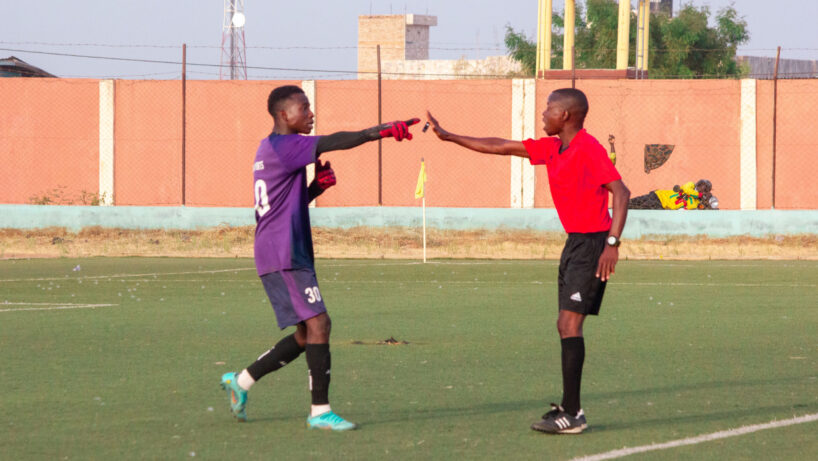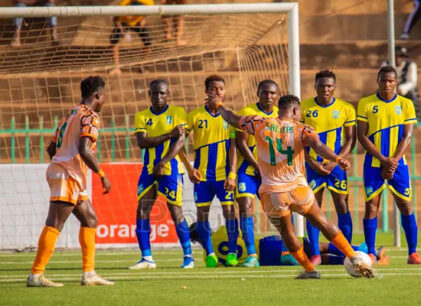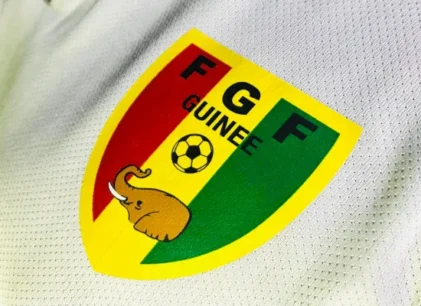The Super League Pro soccer championship of Benin is plagued by turmoil over refereeing decisions. On each day of the championship, criticism is levelled at the men in black. While the referees’ commission has suspended four of its peers, the situation persists.
The lines have not moved in the refereeing in the professional soccer championship of Benin. During the first phase of the championship called Pro League, the refereeing was decried by all actors of the soccer chain. It remains no less for the Super League Pro, second phase of the championship.
After six days of competition, referees have shone by their inadequacy to the whistle. “These decisions are challenged most often wrongly and sometimes rightly. Beninese referees make a lot of effort. What is important is that mistakes are not made on purpose. We have very good referees, however there are black sheep,” said Brice Igue, instructor and trainer of referees in Benin, instructor of referees in the UFOA Zone B and match commissioner in the national championship.
Between refereeing blunders and sanctions
In fire-fighting mode, the Referees Committee of the Beninese Football Federation recently sanctioned four referees for “insufficient refereeing having impacted the result of the match” or “refereeing error that could impact the result of the match”. The defendants received 4 to 6 matches of suspension in the Super League Pro. Nevertheless, the whistle on the fields is still decried. The new situation that is causing controversy is a penalty whistled for Loto-Popo victorious against ASPAC 1-0 at the Grand-Popo stadium on Wednesday, March 15, 2023 during the 6th day of the championship. This umpteenth controversy positions the referee as the weak link in the chain of development of the national championship.
The mode of appointment of referees questioned
In Benin, the mode of appointment of referees is a concept specific to national championships. “In the past, we had to experiment with designations by drawing lots. Now it is the confidential designations. We have a committee of 5 members. It is this committee that designates and communicates to the referees concerned with the mention “Personal and confidential designation”. It is the day of the match that the clubs discover the referees. Elsewhere, it is published days before”, explains the referees’ instructor. This form of appointment of the men in black has always been criticized because some members of the referees’ committee are at the same time club managers. For example, Koto Francis Gbian, first vice-president of the FBF and president of Damissa FC, an elite club, chairs the federation’s referees’ committee. In the middle of last season, Gaston Zossou, president of Loto-Popo FC, the current leader of the Super League Pro, criticized the arbitration. “When I was appointed, I was approached to negotiate with the referees. I found all this detestable and dangerous. The arbitration fraud aims to place the less good above the best, “he revealed.
It is clear that the refereeing in the professional championship is plagued by ills ranging from the precariousness that the majority of the game masters live to their insecurity on the stadiums. On December 27, 2022, the collective of referees had launched a boycott of the national championships in support of their colleagues who were molested and injured at the end of the match Béké FC – US Cavaliers. In a statement of demand, they wanted several changes including the mode of their appointment so far status quo.
What about the training of the men in black?
The quality of the performance of referees on the field also raises the problem of the level of the latter. Indeed, the training courses or refresher courses for referees are insufficient. The Beninese soccer federation has not developed a training program and, as a consequence, a regular evaluation of referees. Those concerned lack initiative themselves, limiting themselves to the knowledge already acquired.
To get the refereeing out of the rut, the former FIFA referee Brice Igue advocates the qualitative training of referees. “It is necessary to increase training, better treatment for referees, equip our referees with communication equipment and the installation of the VAR system in our stadiums. Also, club managers and fans must have a minimum knowledge of the laws of the game,” he concludes.





